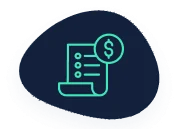Choosing the right finance product is essential if your business is looking to grow, manage cash flow, or capitalise on new opportunities.
With so many options available, from loans and lines of credit to invoice finance and merchant cash advances, finding the best fit can be challenging.
Understanding your needs and how different finance products work will help you make an informed decision and ensure your business has the financial support it needs to thrive.
Understand your business finance needs
To choose the right finance product, consider your business’s specific financial needs and objectives.
The type of finance you choose should align with your business goals, and the right option can provide the funds you need and minimise costs and financial risk. Here are a few things to think about to help you understand your business needs:
- What you need the funds for: Make sure you understand what you want the finance for, whether it’s growth, cash flow, or buying new assets.
- How much you want to borrow: Work out exactly how much you need to borrow to achieve your goals.
- How quickly you need the funds: If you need the funds urgently, this could influence the type of finance you need.
- Your business’s financial position: Consider your cash flow, debts, and assets to understand which products you could qualify for.
Understanding exactly what your business needs will help you assess your options and make an informed decision.
Types of business finance
There are a range of different funding options available to your business, and each has different benefits and is suitable for different needs. Here’s a breakdown of the main options:
Unsecured business loans
An unsecured business loan is a way of borrowing money without using any assets your business owns as security.
They are a good option if your business has no expensive assets or you don’t want to use them as collateral and put them at risk.
- Loan amount: Loans can range from £10,000 to £1m, depending on your turnover and profit.
- Term: Repayments are available for up to 6 years.
- Purpose: They can be used for any business purpose, including debt consolidation, expansion, and stock purchases.
- Suitable for: Businesses looking for medium-term financing without using an asset as security.
Secured business loans
Secured business loans allow you to borrow large sums by securing this on a UK property.
By reducing the risk to the lender, businesses can borrow more at potentially lower interest rates than unsecured loans.
- Loan amount: Loans are typically available from £25,000 to £2m, often based on the value of the asset you’re using as collateral.
- Term: Repayment terms are available between 2 and 15 years.
- Purpose: Any purpose, but ideal for larger projects.
- Suitable for: A business needing a large sum or a company that wants to use its assets to access lower rates.
Asset finance
Asset finance is a way for your business to buy or lease the equipment you need to operate or grow.
The equipment or asset you’re buying serves as collateral for the loan, which means the interest rates can be lower than unsecured business loans.
- Loan amount: Loans can range from £1,000 to £2m depending on your business’s affordability and the value of the asset
- Term: Repayment terms are available for up to 7 years.
- Purpose: Used to buy or lease new equipment or assets
- Suitable for: A business looking to buy new assets without committing a lump sum upfront, as well as a business looking to release cash tied up in owned assets.
Merchant cash advances
Merchant cash advances are a flexible way to access cash based on your business’s credit and debit card sales.
The lender gives you a lump sum upfront, which is then repaid automatically through a pre-arranged percentage of your card sales.
- Loan amount: You can typically borrow up to 2x your monthly card takings.
- Term: There is generally no fixed term as the repayments vary, but agreements tend to run for up to 18 months.
- Purpose: Covering seasonal cash flow fluctuations and ongoing costs, as well as short-term requirements, like investing in marketing or purchasing stock.
- Suitable for: Businesses that take at least £10,000 a month in card/online sales and who experience seasonal sales.
Revolving credit facility
Revolving credit facilities are a line of credit that businesses can access as and when they need funds.
They work similarly to an overdraft and are a flexible, short-term solution that can provide a financial safety net when your business needs it.
- Loan amount: Credit facilities are available from £10,000 to £2m based on your affordability.
- Term: Revolving credit facilities can be available for up to 2 years.
- Purpose: It can be an ideal solution to cover unexpected costs or sporadic cash flow.
- Suitable for: Any business needing flexible access to finance multiple times a year.
Invoice finance
Invoice finance allows your business to release money from any unpaid invoices. The finance provider can advance a percentage of outstanding invoices while you’re waiting to receive payment.
They are a useful way to bridge cash flow gaps, especially if your business operates in an industry with long payment periods.
- Loan amount: Up to 90% of the value of your invoice.
- Term: There is no fixed term, as the loan is repaid when the invoice is received.
- Purpose: The money can be used for any purpose, but they are ideal for boosting cash flow.
- Suitable for: B2B businesses with long payment terms of more than 30 days.
Growth Guarantee Scheme
The Growth Guarantee Scheme (GGS) is a government-backed initiative designed to support access to finance for small businesses looking to grow.
Lenders signed up to the scheme are backed by a 70% guarantee from the government. It’s available through a range of products including loans, asset finance, invoice finance and overdrafts.
- Loan amount: The maximum you can borrow is £2 million, or £1 million for businesses in Northern Ireland.
- Term: The term varies based on the product you choose
- Purpose: The scheme can be used for any purpose, but it is designed to support growth and investment
- Suitable for: Small businesses with a turnover of less than £45 million who need help accessing finance.
How finance can help your business
External funding is often the only way to help your business reach the next level and achieve its goals.
There are a number of ways business finance can help you overcome problems or grow, including:
Growth and expansion
If you’re looking to take your business to the next stage, whether hiring staff, entering new markets, or moving to new premises, you may need a finance option offering a larger sum and longer repayment terms.
Secured business loans could be an ideal option, offering high borrowing limits and lower rates if you have assets to use as collateral. Alternatively, unsecured loans can provide quicker access without requiring collateral.
Covering cash-flow gaps
If your business faces temporary cash flow challenges, a flexible and quick-access solution can help keep operations running smoothly without committing to long-term debt.
A revolving line of credit can give you ongoing access to funds as and when needed, making it perfect for covering short-term gaps. Invoice finance is also a good option, especially if unpaid invoices impact your cash flow.
Investing in new equipment or assets
If your business needs new machinery, vehicles, or technology, financing can help spread the cost. The right finance product can be tailored to the asset’s value and expected lifespan.
Asset finance allows you to purchase or lease equipment while spreading the cost over time. Alternatively, secured loans can be used if you’re investing in higher-value assets and want a structured repayment plan with lower rates.
Funding for seasonal fluctuations
Seasonal businesses often face peaks and troughs. Finance can help you get through quieter periods and make sure you’re ready when business picks up again without putting pressure on your cash flow.
Merchant cash advances may be a good fit if your business has strong card sales. Repayments change in line with your revenue, easing pressure during quieter periods. A revolving credit facility is another flexible option, allowing you to draw funds as needed and repay them when your cash flow improves.
How to choose the right option
To choose the most suitable finance product, weigh up your options and consider how each product fits your business’s needs. Follow these steps to help you make your decision:
- Match the product to your purpose: Narrow down your options based on what you need funding for.
- Check how quickly you can access the funds: If you need funds fast, rule out any products with slow approval or funding times.
- Review affordability: Consider how repayments fit into your cash flow. Look for manageable terms, not just the lowest interest rate.
- Compare total costs: Factor in interest, fees, and whether early repayment is allowed or penalised.
- Understand the risks: If you offer security, ensure you know what happens if you miss repayments.
- Think ahead: Choose a product that supports your plans and won’t limit your flexibility in the future.









